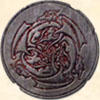Manass
Manass is the least of the Five Great Cities of Khazari. It is also known as the City of White Walls. It rests halfway up a small pass in the front range of the Katakoro Shan. While the city itself is small, it is heavily fortified against the occasional barbarian invader.
The fortifications of Manass were first laid down on the site of a small farming village by the Shou during the Kao dynasty, about 700 years ago. Since that time, the fortress has been destroyed several times, each time to be rebuilt along the same lines as before. Because of the threat from foreign raiders, all inhabitants of Manass, rich or poor, dwell inside the safety of the walls. The ground outside the city is taken up by fields of millet and barley, with some irrigation provided by nearby streams.
The city is laid out in a rough square, approximately a half-mile long on a side. The city still retains the layout set by the Shou geomancers. Streets run in straight lines to form a rectangular grid oriented to the points of the compass, The walls are 30 feet high, made of baked brick and stone plastered over with mud and whitewash.
There are two main gates, the Jade Gate in the center of the east wall and the Stone Gate on the west side. Towers are spaced at regular intervals around the walls. At the center of the city is a large plaza known as the Boyla’s Court. On one side of this plaza is the palace of the governor. Opposite it as a temple of the Yellow Mountain Sect of Khazari.
Buildings in Manass are made from unmortared stone, carefully stacked atop each other. The walls are then plastered with mud and whitewashed. The roofs are either flat terraces used for storage or are covered in yellow-brown tile. Streets are narrow and usually clogged with stacked goods—wood, baskets, jars, and looms. Most houses have balconies that overlook the street.
Because of its position, Manass is an important, trading center. The people are not noted for their arts or crafts, but have a reputation as cunning and occasionally unscrupulous merchants. From the steppe-folk, they buy cheese and wool, From Semphar come caravans of western exotic goods and copper. Some these goods stay in Khazari but most travel further on the Silk Road to Shou Lung. Shou Lung, in turn, sends silks, spices, grain, and wine to the west. The merchants of Manass manage to make a profit from all these transactions.
Manass is one of the lesser gateways to the steppe and so there are some services and many interesting characters here. Aside from the merchants, there are occasional guides, caravan masters, outfitters, itinerant holy men, and bandits.
As a result of the city’s trade and position, the prince of Khazari requires the citizens to maintain a militia here to garrison the walls. The militia is under the command of the governor of the city and supported by taxes paid by the merchants. When called out, the garrison is 5,000 men strong—2,000 infantry and 3,000 riders. Virtually every able-bodied male within the walks takes up arms when the full complement is mustered. While the majority are untrained soldiers, the core is formed of the governor’s bodyguard.The bodyguards wear leather or chain mail, depending on rank. A trooper’s uniform is a cotton robe, dyed blue and trimmed with red, and a pointed cap trimmed with a brilliant green plume. Officers wear bronze or gilt scale male with no outer robe. Standard weapons are short bows and staff-swords (glaives).
Manass’s current governor is Sanjar al-Mulk, third cousin to Prince Ogandi. He is assisted in his duties by Manjusri, a dong chang from the Katakoro Shan. A pair of Shou Lung agents, members of the Royal Vagabonds, posing as merchants are also close to the governor. They keep a watchful eye over the loyalties of the governor and report all their findings back to the Shou Lung Emperor.
''Just prior to the invasion of Shou Lung, Manass was conquered by the Tuigan. Sanjar al- Mulk was taken as a hostage, Manjusri was declared an outlaw, and the Shou Lung agents were put to death. The garrison was destroyed in battle outside the walls, but the city was spared and placed under the command of Jadaran (Prince Jad), the son of Yamun Khahan.''
